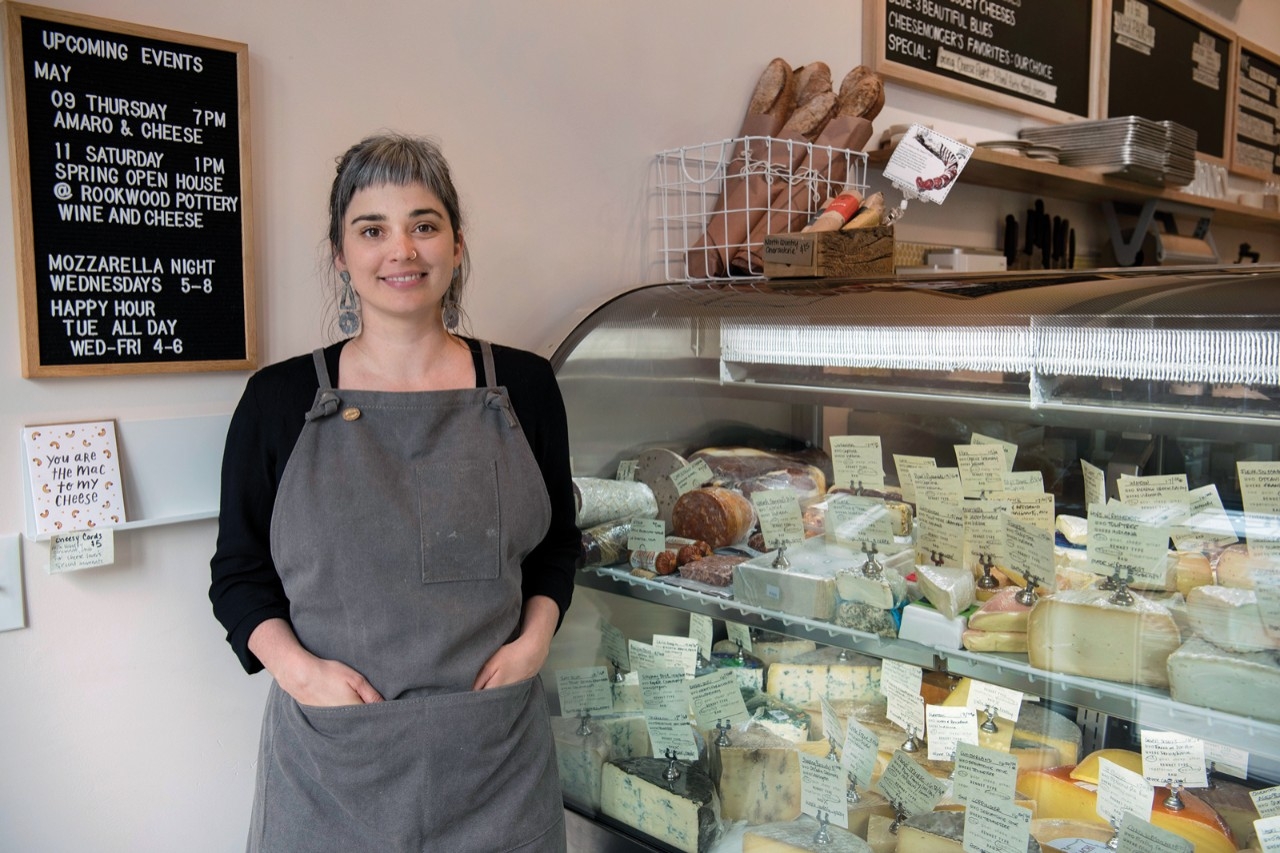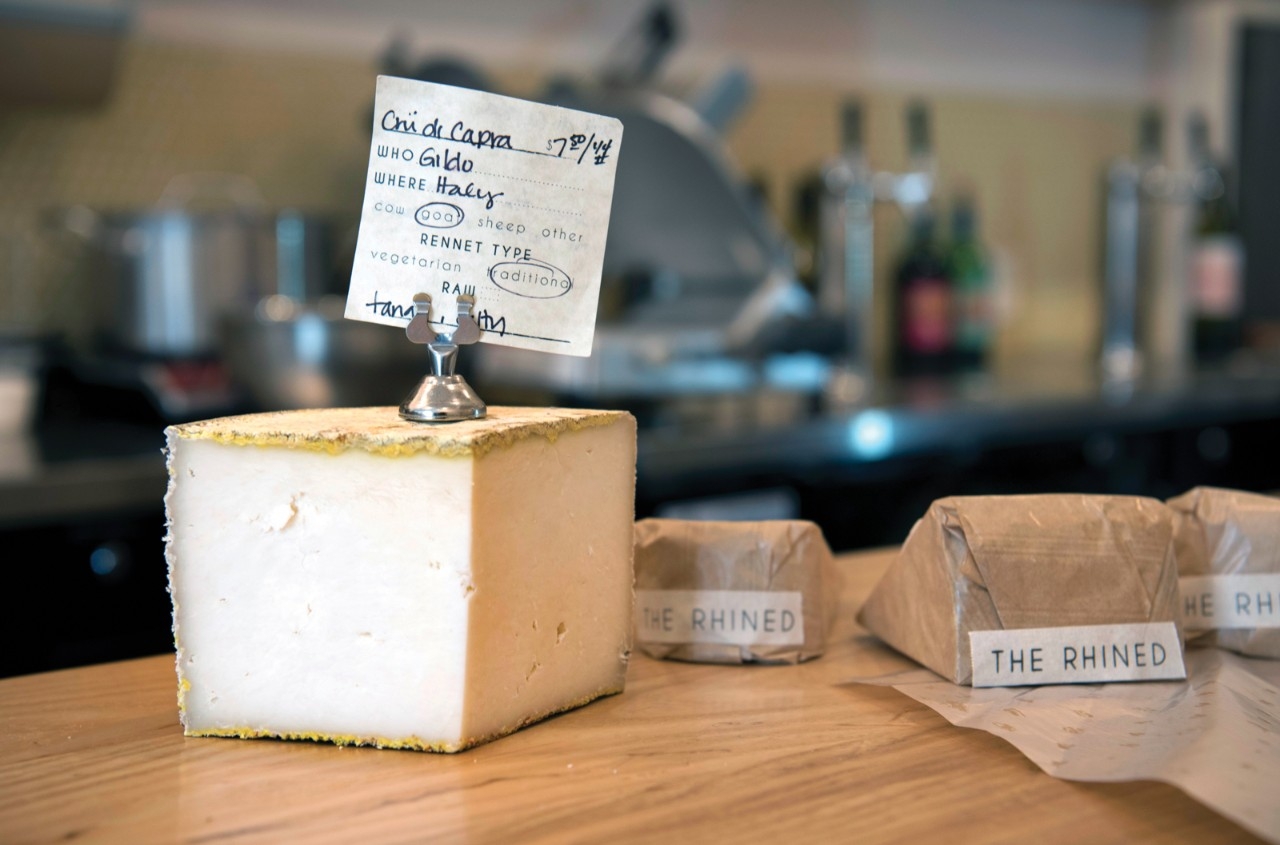A Cincinnati cheese shop puts the focus on local, domestic makers.


Stephanie Webster (‘13) just wanted a cute little shop where she could sip wine, savor good cheese and enjoy a conversation with friends. But she couldn’t find an exact match, so she started her own artisanal cheese shop, The Rhined, in Cincinnati’s historic Over-the-Rhine neighborhood. “I conceived it from the floor to the ceiling,” she says, “every detail, every little thing.”
The Rhined is only a couple of years old, opening in summer of 2017, but the shop’s origin story starts years earlier, in a college class that spurred Webster’s fascination with fermentation and the food products it creates.
After transplanting from Lexington with her to-be husband (and future business partner), Dave, Webster decided to finish her undergraduate biology degree at NKU, where a science lab teacher taught the microbiology of fermentation by making delicious foodstuffs.
“We made an Indian fresh-style cheese and wine out of Welch’s grape juice,” she says. “The professor was telling us how she made yogurt at home on her windowsill, and I was like, wow, this is amazing!” Webster started making yogurt at home, too, then pursued further kitchen adventures, from sauerkraut to raw-milk butter to, you guessed it, cheeses such as fromage blanc and mozzarella. Meanwhile she finished her bachelor’s, attended grad school and, ultimately, took a job teaching high school science—which she quickly realized was wrong for her. “I just couldn’t wait to get back to food.” So after two years of teaching, she quit to become a cheesemonger, and she hasn’t looked back.
Situated on Elm Street, directly across from downtown Cincinnati’s 167-year-old Findlay Market, The Rhined’s cozy storefront features a case jam-packed with cheeses and charcuterie, a few tables and a massive oak bartop with pull-up stools. Artisana lpreserves, pickles and other offerings sit on strategically placed shelves; wines are displayed throughout the store; and a glass-door cooler holds craft beer, chilled wines and assorted beverages

It’s hard to imagine a better setting than The Rhined’s airy and inviting space for aglass of red, cheese flight and engaging conversation (unless you’re sitting on the patio out back on a sunny day). And for people familiar with the neighborhood’s rebirth—in 2009 Over-the-Rhine was notoriously named the most dangerous neighborhood in the U.S. by an insurance analytics company—it’s just further proof that people like Webster and her husband are bringing impactful change to the area.
“We live in the neighborhood—we bought a house almost eight years ago,” she says. “So when we decided to open a business, we knew we wanted it to be in OTR. We know the people here; we know what they want and who our customers would be.” And in addition to being part of the area’s overall revitalization, they’re bringing welcome change to their immediate neighborhood of north Over-the-Rhine, paving the way fornew retail ventures to open and contribute to the burgeoning nightlife. “It’s safer for the neighborhood, to have businesses open at night,” she says. “We’re hoping that by next summer it’s going to be a whole different feel at night.”
At The Rhined, Webster focuses on regional cheeses, infusing decadence with social responsibility by featuring small local and domestic cheesemakers committed to sourcing milk from farmers who raise animals on pasture. “We give these amazing makers, who make beautiful cheese, a voice and a place in a case rather than just devoting it to the same European cheeses everyone else has.” Though The Rhined does sell select European offerings, she believes it’s important to support small, domestic producers first, as they don’t enjoy the subsidies that cheesemakers oversea receive (stateside, most farm subsidies go to corn and soy growers).
With sold-out tasting classes, a steady stream of business and the recent acquisition of Oakley Wines in a nearby neighborhood, it’s safe to say that Webster’s vision for The Rhined is an unqualified success. Not that she was ever worried. “I never doubted it,” she says. “We had so much support from the very beginning that it just felt good. It felt like we could do it.”
